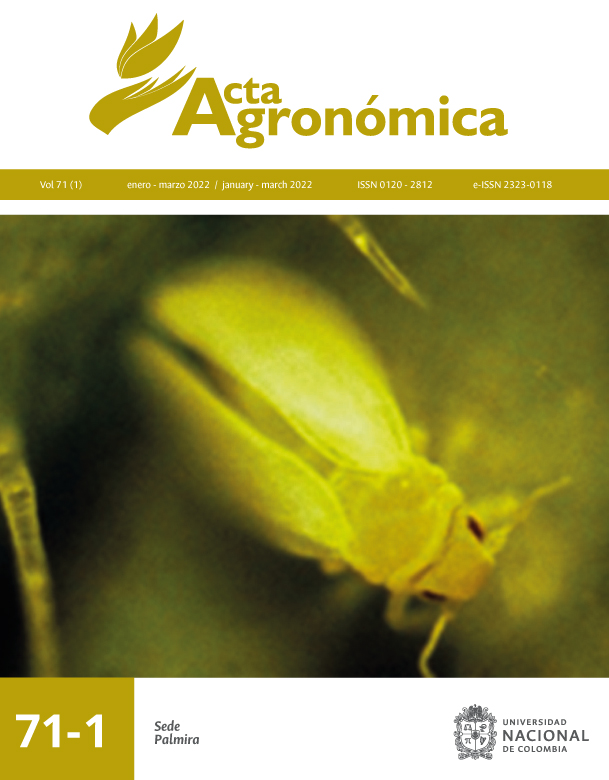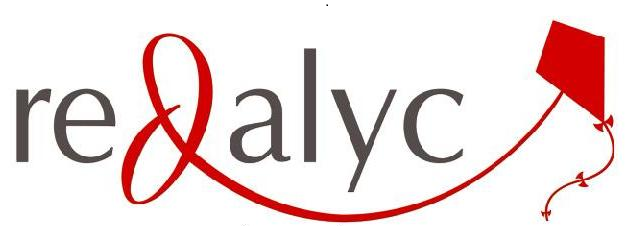Detección molecular de virus en cultivos de uchuva (Physalis peruviana) del suroeste de Antioquia (Colombia)
Molecular detection of viruses in Cape gooseberry (Physalis peruviana) crops from Southwestern Antioquia (Colombia)
DOI:
https://doi.org/10.15446/acag.v71n1.99453Keywords:
certificación de semilla, fitopatología, PCR en tiempo real, Solanaceae, virus de plantas (es)seed certification, phytopathology, real time PCR, Solanaceae, plant viruses (en)
Downloads
La uchuva es una de las frutas promisorias para la zona andina de Colombia gracias a su alta demanda internacional. En Antioquia, su siembra se concentra en el oriente, aunque otras subregiones como el norte y suroeste presentan condiciones óptimas para su cultivo. Ya que las enfermedades de origen viral son uno de los problemas emergentes de este frutal, en este estudio se evaluó la infección de virus de RNA que infectan los cultivos de uchuva en el suroeste de Antioquia. Para esto se utilizaron pruebas de RT-qPCR en muestras foliares de plantas sintomáticas y asintomáticas obtenidas en ocho lotes, así como en ocho muestras de semillas extraídas de frutos comercializados en esta subregión. Los resultados indicaron la presencia en al menos una muestra foliar de los virus PVY, PVX, PVS, CGIV-1 y PMTV, mientras que PVV, PYVV y PhyVNV no fueron detectados. El PMTV (75 %) y el PVX (62.5 %) fueron los virus que presentaron mayores niveles de prevalencia en muestras sintomáticas y asintomáticas, respectivamente. Para el caso de las semillas, se encontró la infección de los virus PVX (87.5 %), PVS (75 %), PVY (37.5 %), PhyVNV (12.5 %) y CGIV-1 (12.5 %). Adicionalmente, mediante análisis de NGS se detectó la presencia de secuencias de los virus CMV, PhyVNV, PVS, y TaLMV. Estos hallazgos señalan la necesidad de establecer en el país programas de monitoreo de virus en cultivos de uchuva y de certificación de semilla.
Cape gooseberry is one of the most promising fruit crops in the Colombian Andes because of its high demand in the international market. In the province of Antioquia, this crop is cultivated mostly in the east, but optimal conditions are also available in the northern and southwestern regions. As viral diseases have become a serious emergent threat to this crop, we have investigated the RNA virus infection in Cape gooseberry crops from southwestern Antioquia. The presence of viruses was tested by RT-qPCR of leaves of symptomatic and asymptomatic plants from eight commercial plots, and eight seed samples from commercial vendors in the region. Our results revealed the presence of PVY, PVX, PVS, CGIV-1, and PMTV in at least one sample of commercial plots; neither PVV, PYVV nor PhyVNV were detected in these samples. PMTV and PVX were the most prevalent viruses in symptomatic and asymptomatic adult plant samples with 75.0 and 62.5 %, respectively. Analysis of seeds revealed 87.5 % prevalence for PVX, 75.0 % for PVS, 37.5 % for PVY, 12.5 % for PhyVNV, and 12.5 % for CGIV-1. A next generation sequencing revealed sequence reads of CMV, PhyVNV, PVS, and TaLMV. These results highlight the need to implement surveillance programs that monitor the health status of commercial plots, and to get certified seed of P. peruviana.
References
Agindotan, B. O., Shiel, P. J. y Berger, P. H. (2007). Simultaneous detection of potato viruses, PLRV, PVA, PVX and PVY from dormant potato tubers by TaqMan real-time RT-PCR. Journal of Virological Methods, 142(1-2), 1-9. https://doi.org/10.1016/j.jviromet.2006.12.012
Agronet. (2020). Red de información y comunicación del sector agropecuario colombiano. https://www.agronet.gov.co/estadistica/Paginas/home.aspx?cod=1
Aguirre, W., Borda, D. y Hoyos-Carvajal, L. (2014). Potyvirus affecting Uchuva (Physalis peruviana L.) in Centro Agropecuario Marengo, Colombia. Agricultural Sciences, 5(10), 897-905. https://www.scirp.org/journal/paperinformation.aspx?paperid=49304
Álvarez, D., Gutiérrez, P. y Marín, M. (2016). Caracterización molecular del Potato virus V (PVV) infectando Solanum phureja mediante secuenciación de nueva generación. Acta Biológica Colombiana, 21(3), 521-531. https://dx.doi.org/10.15446/abc.v21n3.54712
Álvarez, D., Gutiérrez-Sánchez, P. y Marín-Montoya, M. (2017). Genome sequencing of Potato yellow vein virus (PYVV) and development of a molecular test for its detection. Bioagro, 29, 3–14. http://www.ucla.edu.ve/bioagro/Rev29(1)/1.%20ms%201624.pdf
Álvarez, N., Jaramillo, H., Gallo, Y., Gutiérrez, P. y Marín, M. (2018). Molecular characterization of Potato virus Y (PVY) and Potato virus V (PVV) isolates naturally infecting Cape gooseberry (Physalis peruviana) in Antioquia, Colombia. Agronomía Colombiana, 36(1), 13–23. https://dx.doi.org/10.15446/agron.colomb.v36n1.65051
Chomczynski, P. y Sacchi, N. (1987). Single-step method of RNA isolation by acid guanidinium thiocyanate-phenol-chloroform extraction. Analytical Biochemistry, 162, 156–159. https://doi.org/10.1016/0003-2697(87)90021-2
Corrales-Cabra, E., Higuita, M., Hoyos, R., Gallo, Y., Marín, M. y Gutiérrez, P. (2021). Prevalence of RNA viruses in seeds, plantlets, and adult plants of cape gooseberry (Physalis peruviana) in Antioquia (Colombia). Physiological and Molecular Plant Pathology, 116, 101715. https://doi.org/10.1016/j.pmpp.2021.101715
Cutler, J., Langer, J., Von Bargen, S., Acosta-Losada, O., Casierra-Posada, F., Castañeda-Cárdenas, A., Betancourt-Vásquez, M., Cuellar, W., Arvydas-Stasiukynas, E., Altenbach, D. y Büttner, C. (2018). Preliminary evaluation of associated viruses in production systems of cape gooseberry, purple passion fruit, and rose. Revista Colombiana de Ciencias Hortícolas, 12(2), 390-396. http://dx.doi.org/10.17584/rcch.2018v12i2.7799
Duque, M., Marín, M. y Gutiérrez, P. A. (2017). Genome comparison and primer design for detection of Tamarillo leaf malformation virus (TaLMV). Archives of Phytopathology and Plant Protection, 50(13-14), 713-726. https://doi.org/10.1080/03235408.2017.1370934
Edgar, R. C., Drive, R. M. y Valley, M. (2004). MUSCLE: multiple sequence alignment with high accuracy and high throughput. Nucleic Acids Research, 32, 1792–1797. https://doi.org/10.1093/nar/gkh340
Fischer, G., Almanza-Merchán, P. J. y Miranda, D. (2014). Importancia y cultivo de la uchuva (Physalis peruviana L.). Revista Brasileira de Fruticultura, 36(1), 1–15. https://doi.org/10.1590/0100-2945-441/13
Gallo, Y. M., Jaramillo, H., Toro-Fernández, L. F., Marín-Montoya, M. y Gutiérrez, P. A. (2018). Characterization of the genome of a novel ilarvirus naturally infecting Cape gooseberry (Physalis peruviana). Archives of Virology, 163(6), 1713–1716. https://doi.org/10.1007/s00705-018-3796-8
Gallo, Y., Marín, M. y Gutiérrez, P. A. (2020). Detection of RNA viruses in Cape gooseberry (Physalis peruviana L.) by RNAseq using total RNA and dsRNA inputs. Archives of Phytopathology and Plant Protection, 53(9-10), 395-413. 10.1080/03235408.2020.1748368
García, N., Gutiérrez, P. y Marín, M. (2013). Detección y cuantificación del Potato mop-top virus (PMTV) en Colombia mediante qRT-PCR. Acta Agronómica, 62(2), 120-128. https://revistas.unal.edu.co/index.php/acta_agronomica/article/view/32561
García, A. (2021). Prevalence of RNA viruses in certified, and informal potato seed tubers in the province of Antioquia (Colombia). Tesis MSc. Biotecnología. Universidad Nacional de Colombia - Sede Medellín.
Geering, A. D. W., Scharaschkin, T. y Teycheney, P. Y. (2010). The classification and nomenclature of endogenous viruses of the family Caulimoviridae. Archives of Virology, 155(1), 123-131. https://doi.org/10.1007/s00705-009-0488-4
Gil, J. F., Cotes, J. M., González, E. P. y Marín, M. (2011). Caracterización genotípica de aislamientos colombianos del potato mop-top virus (PMTV, Pomovirus). Actualidades Biológicas, 33 (94), 69–84. https://revistas.udea.edu.co/index.php/actbio/article/view/14092
Gil, J. F., Adams, I., Boonham, N., Nielsen, S. L. y Nicolaisen, M. (2016). Molecular and biological characterization of Potato mop-top virus (PMTV, Pomovirus) isolates from the potato-growing regions of Colombia. Plant Pathology, 65, 1210–1220. https://doi.org/10.1111/ppa.12491
Gish, W. y States, D. J. (1993). Identification of protein coding regions by database similarity search. Nature Genetics, 3(3), 266-272. https://doi.org/10.1038/ng0393-266
Gómez, J. E., Morales, F. y Arroyave, J. (1997). Mosaic disease of Physalis peruviana in Colombia. ASCOLFI Informa, 23, 52.
Gutiérrez, P. A., Alzate, J. F. y Marín-Montoya, M. A. (2013). Complete genome sequence of a novel potato virus S strain infecting Solanum phureja in Colombia. Archives of Virology, 158, 2205–2208. https://doi.org/10.1007/s00705-013-1730-7
Gutiérrez, P. A., Alzate, J. F. y Montoya, M. M. (2015a). Complete genome sequence of an isolate of Potato virus X (PVX) infecting cape gooseberry (Physalis peruviana) in Colombia. Virus Genes, 50(3), 518-522. https://link.springer.com/article/10.1007/s11262-015-1181-1
Gutiérrez, P. A., Alzate, J. F. y Marín, M. (2015). Genome sequence of a virus isolate from tamarillo (Solanum betaceum) in Colombia: evidence for a new potyvirus. Archives of Virology, 160, 557–560. https://doi.org/10.1007/s00705-014-2296-8
Gutiérrez, P., Rivillas, A., Tejada, D., Giraldo, S., Restrepo, A., Ospina, M., Cadavid, S., Gallo, Y. y Marín, M. (2021). PVDP: A portable open-source pipeline for detection of plant viruses in RNAseq data. A case study on potato viruses in Antioquia (Colombia). Physiological and Molecular Plant Pathology, 113, 101604. https://doi.org/10.1016/j.pmpp.2021.101604
Hull, R. (2013). Plant Virology. (5th Edition). Nueva York: Academic Press.
Kitajima, E. W. (2020). An annotated list of plant viruses and viroids described in Brazil (1926-2018). Biota Neotropica, 20(2), e20190932. https://doi.org/10.1590/1676-0611-BN-2019-0932
Kumar, S., Stecher, G., Li, M., Knyaz, C. y Tamura, K. (2018). MEGA X: Molecular evolutionary genetics analysis across computing platforms. Molecular Biology and Evolution, 35(6), 1547-1549. https://doi.org/10.1093/molbev/msy096
Marín, M. y Gutiérrez, P. (2016). Principios de virología molecular de plantas tropicales. Bogotá: Corpoica. https://repository.agrosavia.co/handle/20.500.12324/13149
Procolombia. (2020). Uchuva (Goldenberry). https://procolombia.co/sites/default/files/ficha-uchuva-en.pdf
Saitou, N. y Nei, M. (1987). The neighbor-joining method: A new method for reconstructing phylogenetic trees. Molecular Biology and Evolution, 4(4), 406–425. https://doi.org/10.1093/oxfordjournals.molbev.a040454
Savenkov, E.I., Sandgren, M.Y. y Valkonen, J.P.T. (1999). Complete sequence of RNA 1 and the presence of tRNA-like structures in all RNAs of Potato mop-top virus, genus Pomovirus. Journal of General Virology, 80, 2779-2784. https://doi.org/10.1099/0022-1317-80-10-2779
Savi, A., Silva, E., Campos, S., Bolson, C., Vinícius, T., Nhani, A., Bogo, A., Trezzi, R. y Nascimento, F. (2021). Near-complete genome sequence and seed transmission evaluation of Physalis rugose mosaic virus from southern Brazil. Ciencia Rural, 51(4), 1-8. https://doi.org/10.1590/0103-8478cr20200702
Sepúlveda, M., Cardona, D., Gallo, Y., Higuita, M., Gutiérrez, P.A. y Marín, M. (2021). Virome analysis for identification of viruses associated with asymptomatic infection of purple passion fruit (Passiflora edulis f. edulis) in Colombia. The Journal of Horticultural Science and Biotechnology, In press. https://doi.org/10.1080/14620316.2021.1973583
Vallejo, D., Gutiérrez, P. y Marín, M. (2016). Genome characterization of a Potato virus S (PVS) variant from tuber sprouts of Solanum phureja Juz. et Buk. Agronomía Colombiana, 34, 51–60. https://doi.org/10.15446/agron.colomb.v34n1.53161
Zapata, J.L., Saldarriaga, A., Londoño, M. y Díaz, C. (2005). Las enfermedades limitantes en cultivo y poscosecha de la uchuva y su control. En: Fischer, G., D. Miranda, W. Piedrahita y J. Romero (Eds.), Avances en cultivo, poscosecha y exportación de la uchuva (Physalis peruviana L.) en Colombia. Universidad Nacional de Colombia. https://www.researchgate.net/publication/258052317_Avances_en_cultivo_poscosecha_y_exportacion_de_la_uchuva_Physalis_peruviana_L_en_Colombia
How to Cite
APA
ACM
ACS
ABNT
Chicago
Harvard
IEEE
MLA
Turabian
Vancouver
Download Citation
CrossRef Cited-by
Dimensions
PlumX
Article abstract page views
Downloads
Funding data
-
Sistema General de Regalías de Colombia
Grant numbers Proyecto: 1101-805-62786; Convenio 4600007658–779 -
Ministerio de Ciencia, Tecnología, Conocimiento e Innovación
-
Ministry of Environment and Sustainable Development
Grant numbers RGE152-26
License

This work is licensed under a Creative Commons Attribution-NonCommercial-NoDerivatives 4.0 International License.
Política sobre Derechos de autor:Los autores que publican en la revista se acogen al código de licencia creative commons 4.0 de atribución, no comercial, sin derivados.
Es decir, que aún siendo la Revista Acta Agronómica de acceso libre, los usuarios pueden descargar la información contenida en ella, pero deben darle atribución o reconocimiento de propiedad intelectual, deben usarlo tal como está, sin derivación alguna y no debe ser usado con fines comerciales.






 >
> >
>



















